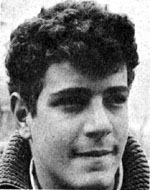Hirschman, Amir
Son of Uri and Zahava. He was born on July 4, 1947 in Beit Ha’Arava; His parents were among the founders of the Arava House in the northern Dead Sea. At the height of the War of Independence, Jordan destroyed the small houses that were built in the Arava out of love and patience. Amir was ten months old when he and all the rest of the children went to the Shefayim farm. Later, when his parents settled in Kabri, in the Western Galilee, he grew up and was educated there. The father and mother have been active in the field of education for many years. Amir studied at a kibbutz school for a year. From the age of 12 he learned to play the violin and devoted most of his spare time to playing during the course of his studies, working in the pear grove and acquiring a great deal of knowledge in the profession. Where he lived with the members of the nucleus for about a year and a half and devoted himself to working in the date groves, and there seemed to be something inside him from the wilderness in which he was born playing with his blood, the passion he was burned upon his departure to the world and the painful dream of his parents. He went to serve with his comrades in the Nahal Brigade, and served for a year and a half Three weeks before the Six-Day War, he was transferred to the service for free and then returned to Eilat, but for ten days during the tense period, he was again recruited in the Battle of Bahan-Eunis, when our men encountered snipers and Amir tried to cross to the other side of the road , He was hit by the enemy’s bullet and died of his wounds after a few hours, on the second day of the battles, on the 26th of Iyar 5727 (June 6, 1967), he was buried in the military cemetery in Bari and later transferred to the eternal rest at Kabri cemetery. The Ga’aton Regional Council was immortalized and the memorial book “Who Fell in the War” was added to the members of Hakibbutz Hameuhad who fell during the Six Day War and afterwards. Kibbutz Eilot issued a leaflet in his memory. A memorial book named “Amir” was issued in his memory (and Gideon to the mountain) by Kibbutz Kabri-Eilot.
